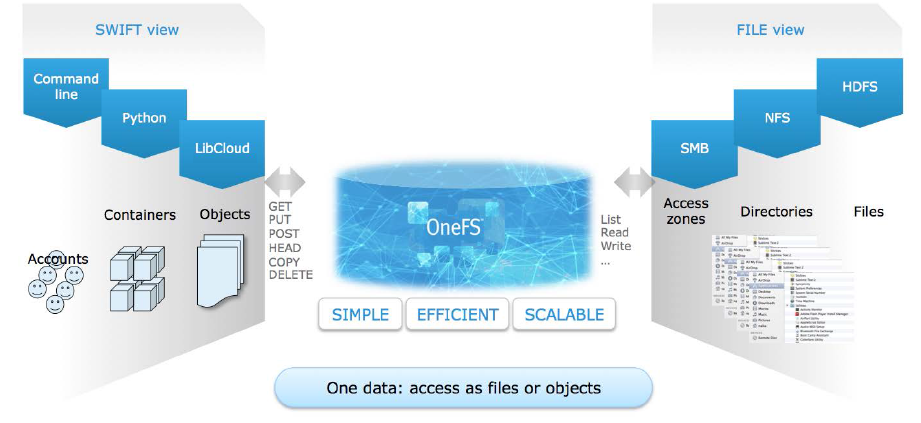Next-generation applications for cloud, analytics, social media and mobile devices rely on object storage to store and access data. Object storage is an efficient way to store large amounts data: it flattens data hierarchy and enables automated API access between storage and applications. You can integrate object storage into your EMC® Isilon® cluster by using the open source OpenStack™ Swift API. OneFS® 7.2 exposes the OpenStack Object Storage API as a set of Representational State Transfer (REST) web services over HTTP. This way, you can direct applications that use the Swift API to store content and metadata as objects on your Isilon cluster.
What are the specific benefits of using Isilon Swift? First, the containers and objects that you save on an Isilon cluster can also be simultaneously accessed as directories and files by using other supported protocols such as NFS, SMB, HTTP, FTP, and HDFS. This interoperability between protocols can eliminate islands of storage and simplify management. Second, you can take advantage of Isilon authentication to secure the content saved through the Swift API.
How Isilon Swift works
The Swift API requests that you submit can store and manage containers, objects, and metadata in the OneFS file system. An instance of the Swift protocol driver runs on each node in the cluster and handles API requests.
The Swift API presents the home directories as accounts, directories as containers, and files as objects. Each home directory in the OneFS file system maps to a Swift account. The directories and subdirectories in a home directory map to containers and subcontainers. Files appear as objects. All objects have metadata.

Authentication in OneFS
When a Swift client connects to an Isilon cluster, the connection must be authenticated. Authentication takes places in an OneFS access zone. Access zones are virtual contexts that you can set up to control access to an Isilon cluster through an incoming IP address. When a Swift user submits an authentication request to the cluster, OneFS creates an access token for the user. This token contains the user’s full identity and security credentials for the access zone that the user is assigned to. For more information about how authentication works in OneFS, see the following white papers: OneFS Multiprotocol Security Untangled and OpenStack Swift Object Storage on EMC Isilon Scale-Out NAS.
Client libraries and HTTP requests
Isilon Swift supports two client libraries: the Python-Swift client library and Apache Libcloud. The following HTTP requests are supported by Isilon Swift to work with these libraries: GET, PUT, DELETE, POST, HEAD, and COPY requests. Isilon Swift does not support certain object store features, such as using the HTTPS protocol and accessing conditional GET and PUT calls based on ETag matching. For more information, see the Isilon Swift Tech Note (login to the EMC Online Support site is required).
For more information
If you want to learn more about Isilon Swift, read OpenStack Swift Object Storage on EMC Isilon Scale-Out NAS. If you have OneFS 7.2 and need commands and procedures for using Isilon Swift, refer to the Isilon Swift Tech Note on the EMC Online Support site.
Start a conversation about Isilon content
Have a question or feedback about Isilon content? Visit the online EMC Isilon Community to start a discussion. If you have questions or feedback about this blog, contact us at isi.knowledge@emc.com. To provide documentation feedback or request new content, contact isicontent@emc.com.